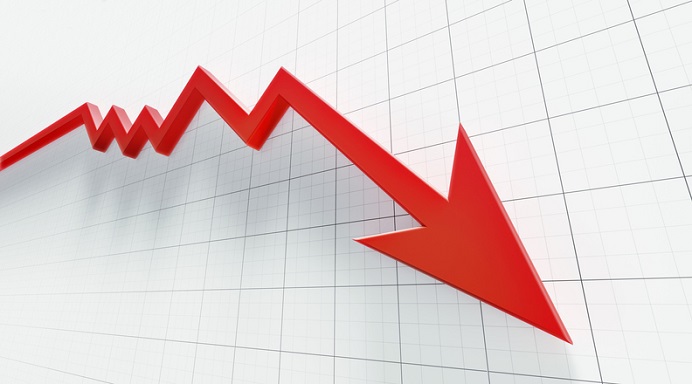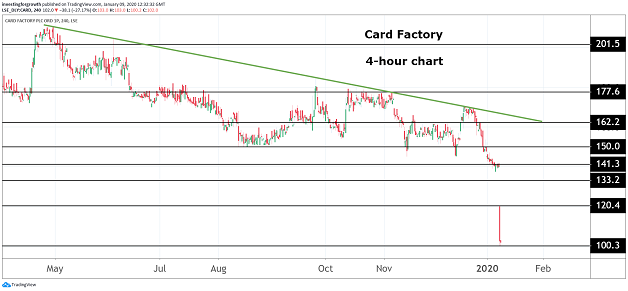Card Factory and SIG hit hard by sell-off
Profit warnings triggered today’s declines, but some analysts think the selling is overdone.
9th January 2020 12:39
by Graeme Evans from interactive investor
Profit warnings triggered today’s declines, but some analysts think the selling is overdone.

A blunt message from Card Factory (LSE:CARD) on Christmas trading has left income investors facing the prospect of no special dividend for the first time since just after the retailer's 2014 IPO.
Having paid £17.1 million, or 5p a share to investors six days before Christmas, Card Factory revealed there's unlikely to be a repeat in the financial year starting in February as it looks to focus on investing in the business and on returning to profit growth.
More details of its refreshed trading strategy will be disclosed with April's annual results, although disappointing Christmas trading now means that annual underlying earnings of between £81 million and £83 million will be about 7% below City forecasts.
- Top 22 income stocks for 2020
- Income hunters can find great funds on ii’s Super 60 recommended list of investments
Card Factory is the first retailer to warn on profits after the festive season, although it is not alone in feeling the pressure from subdued consumer conditions. Building supplies firm SIG followed its October profits warning with another today after weaker-than-expected trading in the UK and Ireland left full-year like-for-like sales for the region down 15.5%.
SIG shares crashed 26% to their lowest level in three years, with Card Factory down by a similar percentage to a record low of 100.2p. Analysts at Investec Securities cut their price target on Card Factory from 240p, but maintain a “buy” recommendation and 155p target based on the company's strong record of cash generation and robust market position.

Source: TradingView Past performance is not a guide to future performance
They are also hopeful that the retailer's 9.3p annual dividend can be protected, although this will be dependent on the findings of the strategic review.
The company has so far returned a total of 100.9 pence per share, or £344.3 million, to shareholders in the shape of special dividends since listing in May 2014, which is equivalent to about 45% of its IPO price. This included 15p a share paid in the 2016, 2017, 2018 financial years as the company benefited from being the only vertically integrated player in the sector.
With its in-house design team, printing facility and central warehousing capacity, this structure has allowed it to operate with significantly reduced costs compared with rivals. Card Factory also continues to open stores, with its 47 new sites so far in the first 11 months of the financial year performing well and bringing the overall portfolio to 1,019 in the UK and Ireland.
It has completed the roll out of its agreement with Aldi to supply a range of everyday cards to 440 of its UK stores, with no signs of cannibalisation of sales in existing shops. More gift and party ranges and increased customer awareness have boosted online trade, with the Card Factory website recording year-to-date growth of 14.8%.
High street footfall, however, has been weaker and means like-for-like sales for the first 11 months of the financial year are down 0.6% year-on-year, despite initiatives resulting in an increase in average transaction value.
Faced with ongoing questions about whether consumer demand for greeting cards is sustainable, the company expects its strategic review to yield a number of “attractive medium-term growth opportunities” across both new and existing channels.
This will require additional investment in the next financial year, but with chief executive Karen Hubbard eyeing a return to profit growth for the following financial period.
Investec added:
“We do not believe Card's vertically integrated, cash generative model is broken, with the strength of its UK market position, potential to optimise its store portfolio and a material longer term wholesale opportunity not reflected in current valuation.”
These articles are provided for information purposes only. Occasionally, an opinion about whether to buy or sell a specific investment may be provided by third parties. The content is not intended to be a personal recommendation to buy or sell any financial instrument or product, or to adopt any investment strategy as it is not provided based on an assessment of your investing knowledge and experience, your financial situation or your investment objectives. The value of your investments, and the income derived from them, may go down as well as up. You may not get back all the money that you invest. The investments referred to in this article may not be suitable for all investors, and if in doubt, an investor should seek advice from a qualified investment adviser.
Full performance can be found on the company or index summary page on the interactive investor website. Simply click on the company's or index name highlighted in the article.